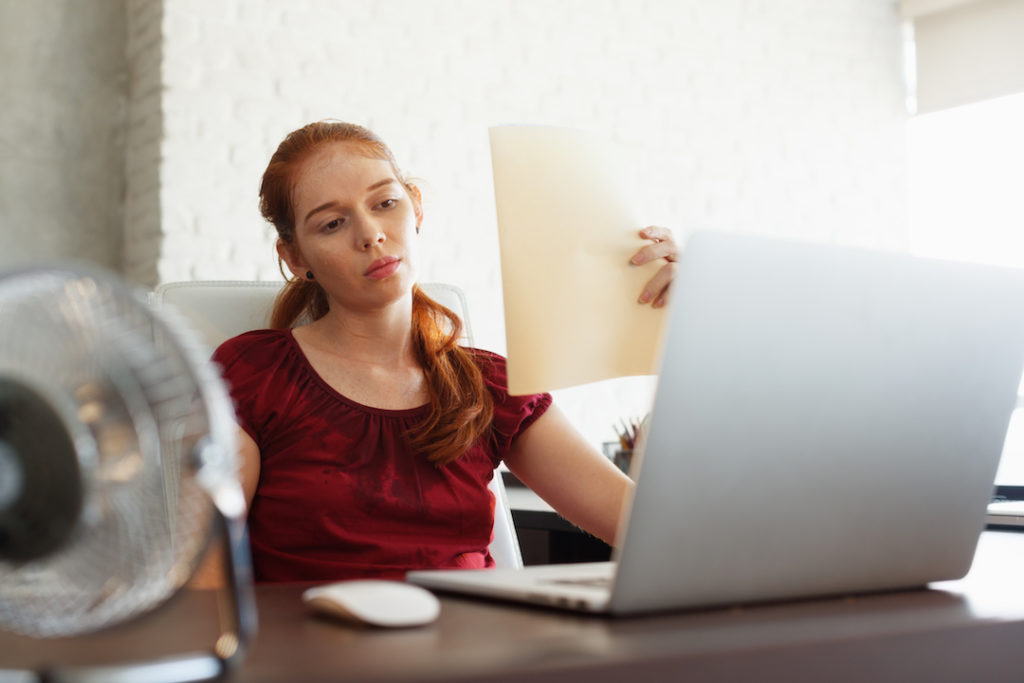6 Common Causes Of Hot Flushes That Aren’t Menopause
January 30 2019Here are some other reasons for hot flushes in women.

You’re doing your thing, minding your own business, when you start to feel the heat. It’s like someone injected your skin with whatever comes in those little hand-warming gel packets.
Hot flushes are annoying, and they can leave you with a pounding heart, flushed skin, and, when they pass, a sweat-stained shirt and a case of the chills.
While it’s true that they are usually associated with menopause and perimenopause, women (and men) of any age can experience them, says nutritionist Beth Battaglino. “Hot flushes can strike at any time and for a lot of different reasons,” Battaglino explains.
Before diving into those reasons, it’s important to point out that experiencing one doesn’t mean anything scary is going on, says nutrition and weight loss specialist Dr Alexandra Sowa. “It’s not clear why some people experience them and some don’t, but for many it’s a benign or transient condition,” she explains.
If you feel like you’re having them on a consistent basis, she and other docs recommend jotting down some notes in your phone or on a pad of paper every time you experience one. “Write down the time of day and what you were doing before they started,” Sowa suggests.
“Keeping that kind of diary may help you make associations or identify your triggers—things such as red wine or stress,” adds gynaecologist Dr Lynn Simpson. This info could also help your doctor figure out the underlying cause of your hot flushes, she says.
Here are the most common triggers that have nothing to do with menopause—and what to do about them.
Prescription meds
Hot flushes are a side effect of many common prescription drugs, Simpson says. She mentions opioids, antidepressants and some osteoporosis drugs as a few of the common medication triggers.
Battaglino recommends looking for symptoms soon after starting a new course of medication. “If they coincide, you’ll know that’s probably the cause,” she adds.
What you should do: Let your doctor know what’s up. He or she may be able to switch you to a similar drug that doesn’t leave you hot under the collar. “It may also be that the hot flushes will go away as your body gets acclimated to the medication, so your doctor can reassure you the discomfort won’t last long,” Battaglino adds.
Excess weight
By now you’ve probably heard that body fat is metabolically active, which helps explain the links between obesity and some cancers. And because excess weight can mess with your metabolism, it can also promote hot flushes, Battaglino says.
What you should do: It’s a predictable remedy. But diet and exercise can bring relief, according to a study. Compared with overweight and obese women who did not attempt to lose weight, those who ate healthily and exercised 200 minutes per week were twice as likely to report fewer hot flushes, the study authors say.
Food allergies or sensitivities
Almost all of us experience something like a hot flush when we eat very spicy foods, Simpson says. But if you have an unidentified food allergy or intolerance, something else in your diet could be the cause, Battaglino explains.
What you should do: Alcohol, caffeine, and additives like sulfites are some common triggers, Simpson says. Pay attention to how your body reacts the next time you ingest any of them, and you may find a correlation. If that doesn’t help, consider speaking with your doctor or a dietitian about a structured elimination diet.
Anxiety
While you’ll often hear the words “stress” and “anxiety” used interchangeably, mental health experts tend to use the term “anxiety” to refer to the physical side of emotions like stress, fear, or worry. A racing heart and nervous fidgeting are two of the classic anxiety symptoms. And feeling anxious can also set off uncomfortable symptoms, Battaglino says.
What you should do: “Reminding yourself to breathe is a simple exercise that can help calm anxiety,” Battaglino explains. Exercise, meditation, and yoga are also effective anxiety busters. If those don’t work, you may be suffering from a more serious form of anxiety. Consider speaking with a doctor or cognitive behavioural therapist.
Medical conditions
Almost any medical problem related to your hormones or endocrine system could lead to menopause-like symptoms. In particular, thyroid issues—especially an overactive thyroid—could explain your bouts of feeling warm, Battaglino says. Infections or viruses can also cause them, Soma explains.
What you should do: If the problem is your thyroid, you’ll likely experience other symptoms besides hot flushes. A racing heart, unexplained weight loss, lots of trips to the bathroom, and feeling extreme fatigue at certain times of the day are all symptoms associated with an overactive thyroid. When it comes to other health issues—including infections—look for an elevated temp and symptoms like diarrhoea or bowel discomfort, Soma says. If you’re experiencing any of those associated symptoms along with your hot flushes, talk to your doc.
A hot bedroom
Your body temperature naturally fluctuates throughout the night, Simpson explains. So it’s common for women (and men) to wake up in the middle of the night feeling overheated or sweaty.
What you should do: If you notice your hot flushes come on in the middle of the night, a warm room, too many blankets, or too much clothing could be your problem. “It may be as simple a fix as turning down the thermostat or sleeping with fewer blankets or clothes,” Simpson says.
Sourced from Prevention.
